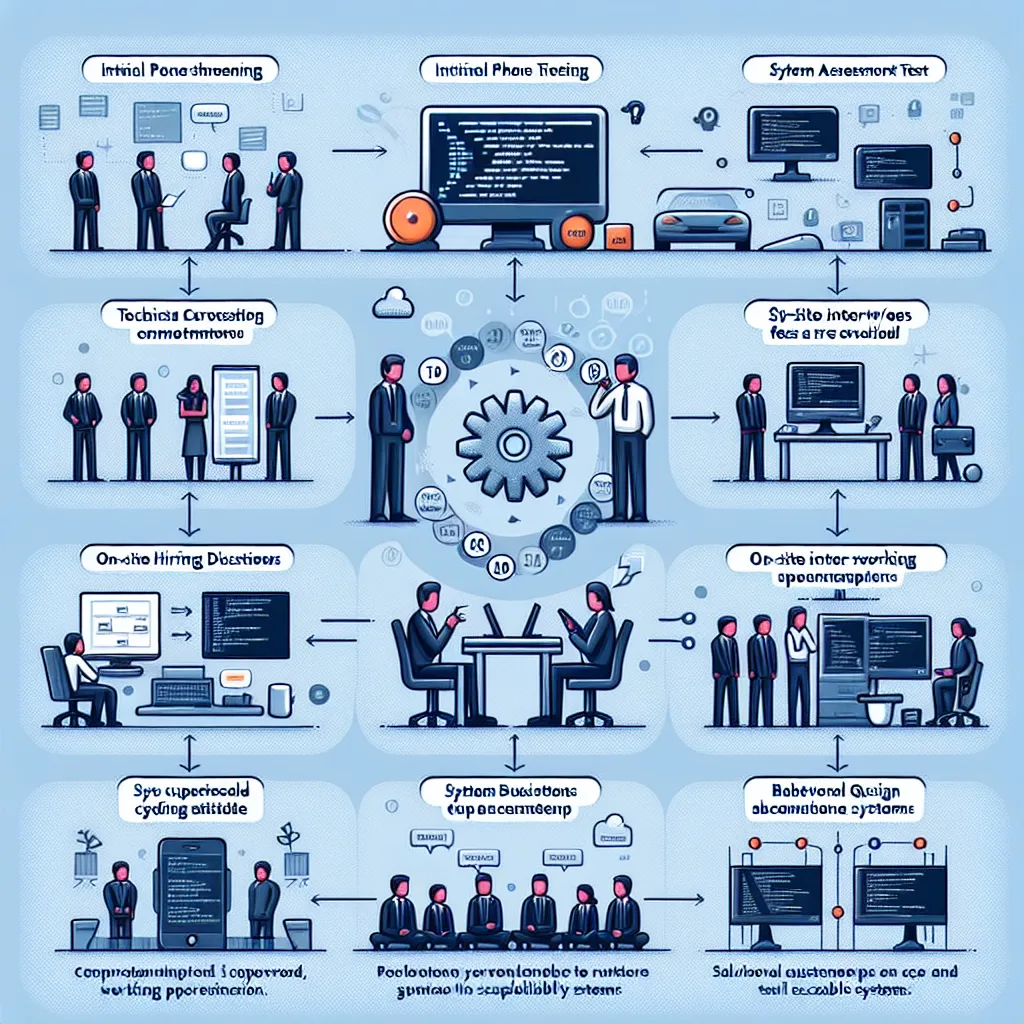In today’s competitive job market, mastering the art of answering tough interview questions is crucial for success. Whether you’re a fresh graduate or an experienced professional, being well-prepared can make all the difference in landing your dream job. This guide will provide you with valuable insights and strategies to tackle challenging questions with confidence and poise.
Understanding the Importance of Tough Interview Questions
Tough interview questions serve multiple purposes for employers. They are designed to:
- Assess your critical thinking skills
- Evaluate your ability to handle pressure
- Gauge your problem-solving capabilities
- Determine your cultural fit within the organization
By understanding the rationale behind these questions, you can better prepare yourself to provide thoughtful and impressive responses.
 Tough interview questions concept
Tough interview questions concept
Common Perspectives of Interviewers
Assessing Professional Competence
Interviewers aim to evaluate your technical skills and industry knowledge. They want to ensure that you have the necessary expertise to excel in the role.
Evaluating Communication Skills
Your ability to articulate your thoughts clearly and concisely is crucial. Interviewers pay close attention to how you structure your responses and express complex ideas.
Analyzing Problem-Solving Abilities
Many tough questions are designed to assess how you approach challenges and find solutions. Employers want to see your analytical skills in action.
Gauging Cultural Fit
Beyond technical competence, interviewers are interested in how well you align with the company’s values and work culture.
Strategies for Answering Tough Interview Questions
The STAR Method
One effective approach to answering behavioral questions is the STAR method:
- Situation: Describe the context
- Task: Explain your role or responsibility
- Action: Detail the steps you took
- Result: Share the outcome and lessons learned
Example:
Question: “Tell me about a time when you had to deal with a difficult team member.”
Answer: “In my previous role as a project manager, I encountered a situation where one team member consistently missed deadlines (Situation). As the project lead, it was my responsibility to address this issue and ensure our project stayed on track (Task). I scheduled a private meeting with the team member to understand the root cause of the delays. We discovered that they were overwhelmed with multiple assignments. I worked with them to prioritize tasks and provided additional resources to support their workload (Action). As a result, the team member’s performance improved significantly, and we completed the project on time. This experience taught me the importance of open communication and proactive problem-solving in team management (Result).”
The Pause and Reflect Technique
When faced with a particularly challenging question, it’s okay to take a moment to gather your thoughts. A brief pause can help you formulate a more coherent and thoughtful response.
Example:
Question: “What’s your biggest professional failure, and how did you handle it?”
Answer: (Take a brief pause) “That’s an excellent question. I believe it’s important to reflect on our failures as they often provide the most valuable learning experiences. One significant professional setback I encountered was…”
Redirecting to Strengths
While it’s important to address the question directly, you can often steer the conversation towards your strengths and positive attributes.
Example:
Question: “What’s your greatest weakness?”
Answer: “I’ve always been quite self-critical, which at times has led me to overthink my decisions. However, I’ve learned to channel this trait into a strength by using it to thoroughly analyze problems and consider multiple perspectives before taking action. This approach has actually helped me make more informed decisions and catch potential issues early in projects.”
Handling Questions Outside Your Expertise
Be Honest and Show Willingness to Learn
If you’re asked about a topic or skill you’re not familiar with, it’s best to be honest while expressing your eagerness to learn.
Example:
Question: “Are you familiar with [specific software or technology]?”
Answer: “While I haven’t had direct experience with that particular software, I’m very interested in learning more about it. In my previous roles, I’ve quickly adapted to new technologies, and I’m confident in my ability to become proficient in this tool as well. Could you tell me more about how it’s used in your organization?”
Bridge to Related Experience
Even if you don’t have exact experience, you can often draw parallels to similar situations or skills you possess.
Example:
Question: “Have you ever managed a team of more than 10 people?”
Answer: “While my direct management experience has been with smaller teams of up to 7 people, I’ve successfully coordinated cross-functional projects involving 15+ team members from various departments. This experience has honed my skills in communication, delegation, and conflict resolution, which I believe are crucial for managing larger teams effectively.”
Common Mistakes to Avoid in Tough Interviews
Lack of Preparation
One of the most significant mistakes is failing to research the company and role thoroughly. This can lead to generic answers that don’t resonate with the interviewer.
Solution: Dedicate time to study the company’s mission, recent news, and industry trends. Prepare specific examples that demonstrate how your skills align with the company’s needs.
Overconfidence or Arrogance
While confidence is essential, crossing the line into arrogance can be off-putting to interviewers.
Solution: Strike a balance between showcasing your achievements and demonstrating humility. Use phrases like “I was fortunate to be part of a great team” or “I learned a lot from that experience” to show a growth mindset.
Negativity About Past Employers
Speaking poorly about previous jobs or bosses is a red flag for many interviewers.
Solution: Even when discussing challenging past experiences, focus on the positive outcomes and lessons learned. For example, instead of criticizing a former manager, you could say, “While we had different management styles, I learned valuable lessons about adapting my communication approach.”
Failing to Ask Questions
Not having thoughtful questions for the interviewer can signal a lack of interest or preparation.
Solution: Prepare a list of insightful questions about the role, team dynamics, and company culture. This shows your enthusiasm and helps you gather important information about the position.
 Common interview mistakes
Common interview mistakes
Follow-up Questions and Suggested Answers
-
Question: “How do you handle tight deadlines and high-pressure situations?”
Suggested Answer: “I thrive in fast-paced environments. In my previous role, I developed a system of prioritizing tasks and breaking large projects into manageable chunks. This approach, combined with open communication with team members and stakeholders, has consistently helped me meet tight deadlines while maintaining high-quality work.” -
Question: “Describe a situation where you had to influence someone who didn’t agree with you.”
Suggested Answer: “In a recent project, I encountered a colleague who strongly disagreed with the proposed marketing strategy. I scheduled a one-on-one meeting to understand their concerns fully. By actively listening and acknowledging their points, I was able to incorporate some of their ideas while explaining the data-driven rationale behind the original strategy. This collaborative approach led to a stronger, more comprehensive plan that we both supported.” -
Question: “How do you stay updated with industry trends and new technologies?”
Suggested Answer: “I’m passionate about continuous learning. I regularly attend industry webinars and conferences, subscribe to relevant professional journals, and participate in online forums. Additionally, I’m part of a local professional network where we meet monthly to discuss emerging trends and share insights.” -
Question: “Tell me about a time when you had to adapt to a significant change at work.”
Suggested Answer: “During the pandemic, our company rapidly shifted to a remote work model. I took the initiative to learn new collaboration tools and helped create virtual team-building activities to maintain team cohesion. This experience taught me the importance of flexibility and proactive problem-solving in uncertain times.” -
Question: “How do you handle constructive criticism?”
Suggested Answer: “I view constructive criticism as an opportunity for growth. In my last role, my manager pointed out areas where my presentation skills could improve. I appreciated the feedback and enrolled in a public speaking course. This not only enhanced my presentation abilities but also demonstrated my commitment to personal development.”
Conclusion
Mastering the art of answering tough interview questions is a valuable skill that can significantly boost your chances of landing your desired job. By understanding the interviewer’s perspective, preparing thoughtful responses, and avoiding common pitfalls, you can navigate even the most challenging interviews with confidence.
Remember, practice is key. Consider conducting mock interviews with friends or mentors to refine your responses and build confidence. With thorough preparation and the right mindset, you’ll be well-equipped to tackle any tough question that comes your way.
For more insights on acing your interviews, check out our related articles on how to answer questions about leadership style and how to prepare for a final interview.
We’d love to hear about your experiences with tough interview questions. Share your strategies or challenges in the comments below!




